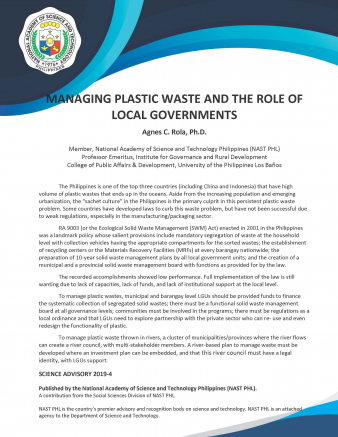The Philippines is one of the top three countries (including China and Indonesia) that have high volume of plastic wastes that ends up in the oceans. Aside from the increasing population and emerging urbanization, the “sachet culture” in the Philippines is the primary culprit in this persistent plastic waste problem. Some countries have developed laws to curb this waste problem, but have not been successful due to weak regulations, especially in the manufacturing/packaging sector.
RA 9003 (or the Ecological Solid Waste Management (SWM) Act) enacted in 2001 in the Philippines was a landmark policy whose salient provisions include mandatory segregation of waste at the household level with collection vehicles having the appropriate compartments for the sorted wastes; the establishment of recycling centers or the Materials Recovery Facilities (MRFs) at every barangay nationwide; the preparation of 10-year solid waste management plans by all local government units; and the creation of a municipal and a provincial solid waste management board with functions as provided for by the law.
The recorded accomplishments showed low performance. Full implementation of the law is still wanting due to lack of capacities, lack of funds, and lack of institutional support at the local level. To manage plastic wastes, municipal and barangay level LGUs should be provided funds to finance the systematic collection of segregated solid wastes; there must be a functional solid waste management board at all governance levels; communities must be involved in the programs; there must be regulations as a local ordinance and that LGUs need to explore partnership with the private sector who can re- use and even redesign the functionality of plastic.
To manage plastic waste thrown in rivers, a cluster of municipalities/provinces where the river flows can create a river council, with multi-stakeholder members. A river-based plan to manage waste must be developed where an investment plan can be embedded, and that this river council must have a legal identity, with LGUs support.

